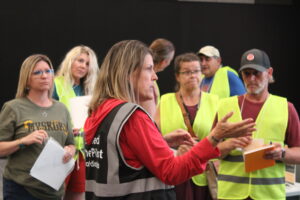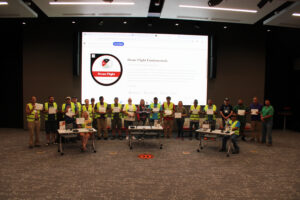OKMULGEE – The sound of spinning propellers whistling could be heard inside and outside of the College of Muscogee Nation Lecture Hall on Aug. 15. The sound came from drones, both big and small, at the CMN Extension Drone Fundamentals Workshop. The workshop was the pilot class for a new public micro credential series hosted by the college. It was open to all ages interested in obtaining their Recreational UAS Safety Test (TRUST) certification. There, registrants learned about how to safely fly drones through instruction and hands-on obstacle courses.
The purpose of TRUST is to provide educational safety materials to recreational flyers. It is legally required for anyone flying drones for recreational purposes in the United States. These purposes can include property surveys, photography or simply flying for fun. The test goes over drone safety, limitations, air space, and weather patterns. A TRUST test typically takes a half hour or less to complete.
CMN Stem Instructor Angie Sexton teaches math fundamentals, college algebra, and classes on drones. According to Sexton, CMN wanted to provide an in-person opportunity for those seeking to learn more about piloting unmanned aerial vehicles.

“We turned it into a micro credential so that you would have each person experience it, versus just an online experience,” Sexton said. “We had all of our drones out so the participants could have access to them. It gives them more hands-on opportunities.”
The class initially had 20 open spots available. It reached maximum capacity in under 72 hours after registration had opened. Scholarships were available for those that needed it.
Once an individual has successfully completed their TRUST certification, they can present their TRUST certificate to the FAA or local law enforcement to prove they are licensed to fly drones for non-commercial uses.
Recreational drone licenses can also be used in agriculture. Larger pesticide drones can replace traditional crop dusting airplanes. According to Sexton, using airplanes as crop dusters on average typically carry a 20 percent profit loss, drones on the other hand only carry a two percent profit loss. Drones can even be programmed to dust crops by itself without a pilot. This can potentially support food sovereignty, or autonomy over food production, one of the core mission values of the CMN Extension Office.
The workshop featured guest lecturers from the Muscogee (Creek) Nation Geospatial Department (GIS) and the Lighthorse UAV Special Operations Squad. GIS lectured on safety practices. Lighthorse set up their command center in the parking lot outside the lecture to show their drones in action.
Sexton said the college is planning to host the micro credential workshops quarterly. The next micro credential workshop she plans to teach is on the FAA Part 107 Remote Pilot Exam, a certification taken by government employees and first responders for safety missions. That certification will require four five-hour classes that will total 20 hours of instruction to prepare for the exam. TRUST registrants have already expressed interest in signing up for the Part 107 class.
“It’s (Part 107) like taking your pilot’s license, it’s very detailed and takes hours upon hours to study,” Sexton said. “The only difference between a drone pilot’s license and flying an airplane is the airplane experience. It’s that detailed.”

Free TRUST materials, including the test itself, can be found online. For those interested in obtaining their TRUST certification, a free test can be taken through the Pilot Institute here. Resources on FAA drone registration can also be found on the website.
In addition to the micro credential workshop on Part 107, Sexton said the college will also offer workshops on 3D printing and laser printing. To stay up to date on announcements regarding future CMN micro credential workshops, follow their Facebook page, College of Muscogee Nation.





